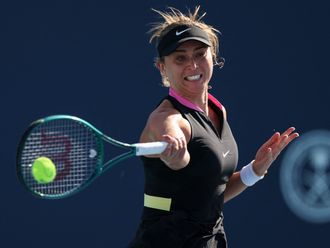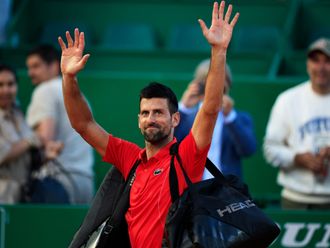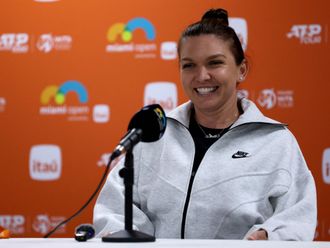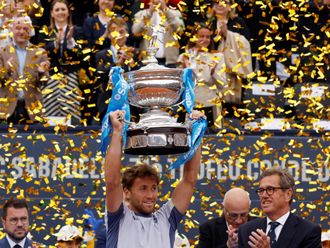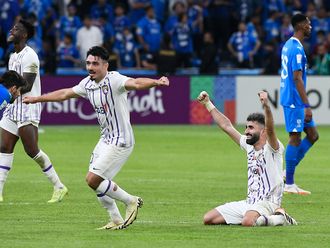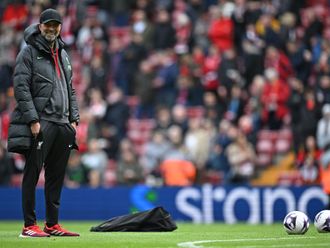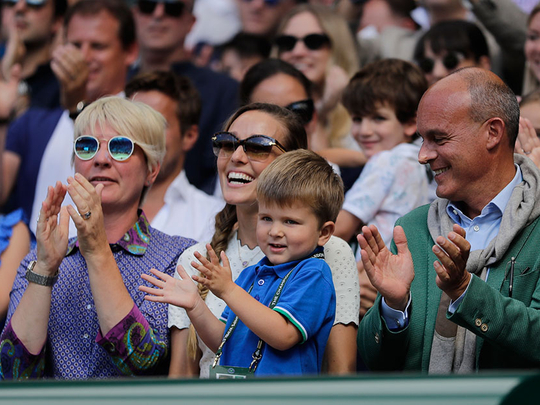
London: As a man firmly in touch with his spiritual side, who once enlisted a Spanish “love and peace” guru specialising in long hugs, Novak Djokovic might have been expected to go heavy on Sunday on the concept of rebirth.
A fourth Wimbledon title, just five weeks after an early French Open exit left him so crestfallen that he doubted whether he would even play on grass this summer: it was enough to make anybody invoke the powers of the divine.
And yet at the moment of triumph, Djokovic kept it all delightfully simple.
There was no thumping of his chest, no superhero shredding of his sweat-drenched top. His greatest indulgence was to help himself to a double portion of the Centre Court grass, about as much as his strict gluten-free diet, needed to maintain that pipe-cleaner physique, would permit.
Then, in a gesture that lifted the crowd’s lukewarm reception, he turned to his box and showed off the golden Challenge Cup for his three-year-old son, Stefan, to admire. While All England Club edicts do not allow for toddlers under the age of five to watch matches on show courts — no tantrums on break points, thank you very much — they were at least relaxed for the after-party.
This was one trophy that Djokovic, even with his ascetic nutrition regime, deserved to celebrate long and hard. For the impression throughout this Wimbledon fortnight was that the Serb had re-established control over not just his game, but his life, too. For almost two years, his private affairs had been the subject of some uncomfortably public debate.
Newspapers in his homeland alleged that he had endangered his marriage with several liaisons, while John McEnroe said last year that the fallen world No. 1 “had some off-court issues with the family”.
McEnroe controversially invited a parallel between Djokovic and Tiger Woods, as examples of sportsmen whose form apparently disintegrated due to troubles on the domestic front. It is a comparison he has now thrown off.
This tournament has shown a version of Djokovic that some feared had gone for good: the consummate retriever, haring down every lost cause, trading blows with Rafael Nadal for the best part of 5 1/2 hours, and ultimately reaching a fifth Wimbledon final that he won with room to spare against Kevin Anderson in the fierce sunshine.
Conspicuously, there has also been a reassertion of Djokovic the family man. While his wife Jelena was notably absent courtside at last year’s Wimbledon, she was back front and centre for his victories here. It was a narrative not explicitly stated in the questions Djokovic received last night “about everything you’ve been through these last 18 months”. The man of the hour preferred to focus on his battle to recover from a serious elbow injury, but the restoration of peace and harmony at home has proved crucial in his return to the summit.
Djokovic will always be a figure admired rather than adored on these lawns. One could tell as much from the muted reactions that his play attracted in this comfortable quelling of Anderson. When he faced set point at 5-4 down in the third, some fans called out with the ball in mid-air, as if willing his forehand to go long.
Not unreasonably, he glared at umpire James Keothavong in reproach. He has reason to feel that he deserves greater respect on this stage, especially given he has amassed more championships here than McEnroe or Boris Becker. After Roger Federer and Pete Sampras, he is only the third man to have won four Wimbledon titles in the Open era.
It was quite the flourish with which to confirm the revival of the greatest triopoly in sport.
Between them, Federer, Nadal and Djokovic have now accumulated 50 grand slam titles, all in the space of 61 tournaments since Wimbledon 2003. It is a level of dominance unprecedented in the modern game, and the fascination in the years to come will be to see how close Djokovic, with his 13 majors, can push Federer, with 20. It is a huge ask, not least when the Swiss gives little sign he is finished yet, but Djokovic has served notice at Wimbledon he is tapping back into a rich seam of inspiration.
The last time he prevailed here, in 2015, he went on to add the next three slams.
He has found virtue in familiarity, ditching the experiments with celebrity coaches — Becker and Andre Agassi have both come and gone — in favour of a reunion with Marian Vajda, his former trainer, and Gebhard Phil-Gritsch, his fitness expert. “I love these guys,” he said last night. In some ways, Djokovic has not so much rebounded from the brink as come full circle, ditching the high-profile entourage and embracing his most trusted lieutenants anew.
One moment yesterday stood out for Djokovic, far above any of his exploits on a baking court. It came after he had exchanged pleasantries with the Duke and Duchess of Cambridge, and headed off for his first round of television interviews. In the room outside, his son Stefan bounded in for an embrace. It was a moment, Djokovic reflected, that he would treasure the most, one that would endure long after the glory faded.
Even at 31, he is wise enough to appreciate that the older you get, the more it means.
— The Telegraph Group Limited, London 2018


